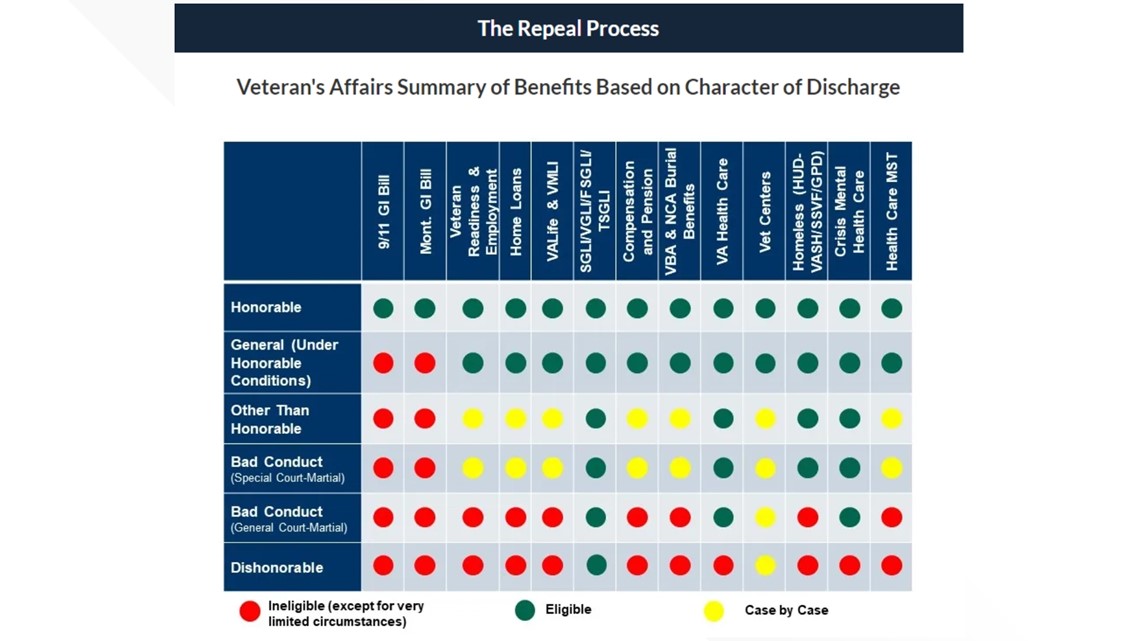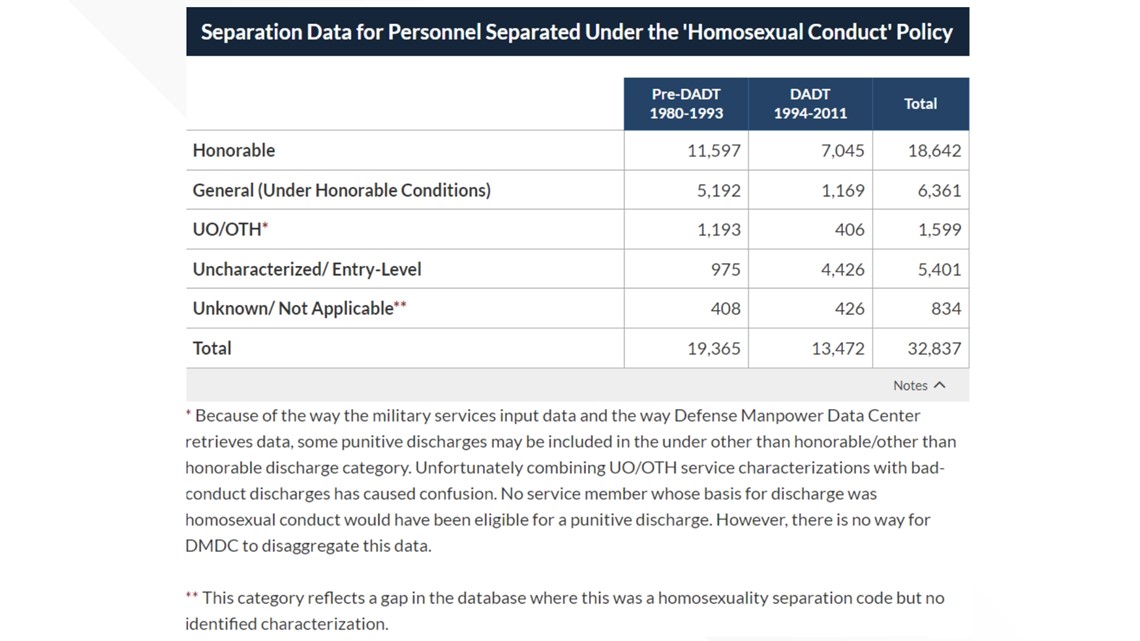The lasting impact of the US military ban on gay servicemembers, effort to fix the past
A lawsuit against the Department of Defense seeks to remove any mention of sexual orientation or homosexual conduct from the military records of discharged veterans.
CBS 8

Don't Ask, Don't Tell
Twelve years since “Don’t Ask, Don’t Tell” was repealed, the United States has worked to right the injustices caused by the military’s ban on gay men and women serving in the armed forces.
In September, the Department of Defense announced a new, expansive outreach effort to contact veterans who were discharged from the military under Don’t Ask, Don’t Tell, which deprived thousands of people of vital benefits for years.
The outreach campaign aims to bring awareness to the department's discharge status review process for veterans separated due to sexual orientation.
But what about the estimated thousands of veterans who were separated from the military before Don’t Ask, Don’t Tell became law in 1992?
A new lawsuit is calling for the Department of Defense to do more.
Plaintiffs are suing the DOD for the removal of all narratives and separation codes from military records that identify a discharged servicemember's sexual orientation. The move would remove any mention of homosexual conduct on military records, ending what the lawsuit claims is '"ongoing discrimination perpetuated by their discharge papers."
For servicemembers, even decades after being separated from the military, seeking a discharge upgrade brings up painful memories and old wounds.
A call to service
United States servicemembers enlist in the military for different reasons. For Melissa Johnson, serving her country meant a ticket out of small-town New Jersey.
After graduating high school in 1981, Johnson left her small town for basic training in Texas. Shortly after, she was stationed in England and a member of the U.S. Air Force.
“I really didn't realize that at the time, that I would really fall in love with the military and my military service,” Johnson said.
Johnson had ambitions of getting her degree and moving up the military ranks. She hoped she could use her service to eventually go to law school.
‘I was proud of my military service. I was proud of the fact that I was a service member,” Johnson said.
Two years into her service in the Air Force, Johnson was called in for a meeting.
What it means to be discharged
“It was a terrifying experience,” Johnson said.
Johnson said she was 19 years old when two investigators with the Air Force Office of Special Investigations asked to meet with her. She didn’t know that her military career and ambitions were about to come to an end.
Once in the meeting, Johnson said she was asked if she was a homosexual.
“I thought, 'Oh, this is the conversation that no gay service member wants to happen',” Johnson said. “At the time I was 19 You know, scared to death.”
Johnson denied she was gay to the investigators, sitting through three hours of intense questioning.
“They grilled me with questions about what I did, and who my friends were, and, you know, just just anything you can imagine,” Johnson said.
As investigators continued to interview her over the next few days, Johnson contemplated her future.
She said she didn’t want to live in fear and hide. Johnson considered a friend who served in the Air Force for more than a decade and was discharged because she was gay.
One week after the interview, Johnson went to her commander and said she wanted to leave the military.
Weeks passed by until she was sent back to the U.S., but during that period Johnson said she was called to testify against other servicemembers facing similar charges.
Johnson said she testified in front of multiple military tribunals and repeatedly said she didn't have any information about other servicemembers.
In less than three years, Johnson’s blossoming career in the military was over.
“It was just tearing down every, you know, every piece of me, it nearly destroyed me,” Johnson said.
Military records
According to the Department of Defense, more than 30,000 servicemembers were separated from the military for homosexual conduct. This includes servicemembers discharged under Don't Ask, Don't Tell and before the policy was created.
Since the law was repealed, the Pentagon has created a process for servicemembers seeking to upgrade their discharge status.
But despite the department’s efforts, less than 2,000 veterans have applied to have their records reviewed.
The specific discharge reason for each veteran varies in classification, from the severe dishonorable discharge, to honorable discharge and other than honorable discharge.
Depending on the type of discharge, a veteran could be deemed ineligible for vital veteran benefits.


But for most veterans seeking to have their discharge upgraded, the ultimate goal is to have a stain removed from their cherished military record.
“It's not just getting the benefits. But it's the recognition that they have served honorably,” said Gary Barthel, Military Law Center managing partner.
Servicemembers discharged for homosexual conduct have their sexual orientation permanently noted on their military records.
A class action filed by veterans against the Department of Defense is seeking to have the government end its "ongoing discrimination perpetuated by their discharge papers."
"Requiring LGBTQ+ veterans to first bear the stigma and discriminatory effects of carrying indicators of sexual orientation on their DD-214s, and then navigate a broken record correction process to seek resolution, violates their constitutional rights to equal protection, informational privacy, property, and due process protected by the Fourteenth and Fifth Amendments to the U.S. Constitution," reads the lawsuit.
Experts agree that the Department of Defense's record correction system is broken.
"The fact that it has taken this long for the Department of Defense to try and find a solution that expedites the process speaks for itself how the system is broken," Barthell said.
Barthell said after a petition has been filed, the military board of corrections can take anywhere from 10 to 18 months to issue a decision.
"So with regard to whether or not this new process works, I think time will tell but I'm not completely confident that it will," Barthell said.
"It does seem like every, every anniversary of the repealing of Don't Ask, Don't Tell, DOD comes out with some sort of milestone message as to, 'hey, we're going to do this or that, you know, to try and improve the making things right, for those who who have been separated.' But I think history clearly shows it's been a long and laborious process."


'Good people'
Similar to thousands of veterans discharged because they were gay, Johnson had to create a new life for herself. And she used her experience of being discharged to propel her.
Johnson is now a partner at the Law Firm of Johnson Heeder and San Diego County Bar Association President. She was also a 2023 Veterans Wall of Honor inductee, honored by The San Diego LGBT Center for her work as a veteran fighting for workers' rights.
After forty years and a long list of accomplishments, Johnson still wonders: “What if?”
"It makes me wonder what I could have accomplished had I been able to actually have a military career. When I think about that, it makes me mad," Johnson said. "Because any successes that I would have had, anything I could have done serving our country was just grabbed away from me. And there was nothing I could do about it."
Johnson said she supports the class action against the Department of Defense and would be a class member in the lawsuit.
"It's important to know where we came from, so that we can protect where we are, and to keep making advances to have our rights, and to make sure that we're treated with dignity and decency and respect and equality. Because our rights, they're fragile, especially if we don't stand up and protect them."
For Don't Ask Don't Tell resources from the Department of Defense, click here.
